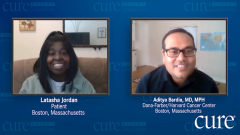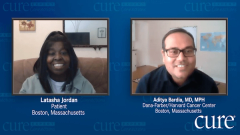
Considerations for Referral After Progression of TNBC
A patient with triple-negative breast cancer, Latasha Jordan, reflects on the mental and emotional challenges she faced when she learned of her disease progression and shares her positive experience with physician referral thereafter.
Episodes in this series

Aditya Bardia, M.D., MPH: In terms of management, I would like to hear about your experience. You were referred to MGH [Massachusetts General Hospital]. How was that experience and your initial experience with treatment? Then, I’ll also review what we would do, in general, outside of clinical trials.
Latasha Jordan: She told me to look out for a call from you guys, and I did receive that phone call. It was so overwhelming, because you guys were on point. You were ready to tackle this. But in my mind, I was like, “I need a break.” I needed a break. So, I didn’t answer that call. I’m sorry I didn’t answer you guys right away.
Aditya Bardia, M.D., MPH: It’s fine.
Latasha Jordan: I was going away for the weekend, so I was like, “I’ll call them on Monday.” I called you on Monday and made the appointment. I met you. I’m so thankful that my doctor was not going to hand me over to just anyone. She handed me over to you. I trust her. And now you show me the same love that she showed me. You were so kind. You even drew things out for me, like, “This is what it is going to look like. This is the name….”
Even though you were talking to me, my mind was somewhere else. I’m going to be honest with you now. I did not hear everything you said to me. I just heard whatever I heard. Do you know how you have a feeling that you don’t have to worry about anything, whether you’re hearing something or not? You probably should’ve heard that. You heard what you heard, but you’re comfortable and you know that person’s going to take care of you. That’s how I felt about you. I knew you and your team were going to take care of me no matter what I heard along the way. What I didn’t hear, I ended up hearing later. You explained everything to me in detail. You didn’t leave anything out. And, you asked me questions. I don’t remember if I asked you any questions. I trusted you.
I want to thank you for being such a great person. You treat me like family, and I thank you for that. It’s an honor and a blessing. I thank God for you and your team.
Aditya Bardia, M.D., MPH: It’s mutual, Latasha. It’s a pleasure taking care of you. Thanks for highlighting a very important point. Studies have shown that during a physician-patient encounter, especially at times when there’s a major change in either the disease or treatment and there are several options, patients usually remember 20% to 30% of what’s said. That’s why it’s recommended, from a provider perspective, that you provide educational materials and write things down. This way, the patient has something to refer back to. Having a family member at appointments is also very helpful. This has been very challenging during COVID-19 because of the restrictions. Some patients tend to record things so they can go back and listen again. But what you highlighted is something that’s quite common, and I very much appreciate you bringing this up and being honest about this.
Transcript edited for clarity.





